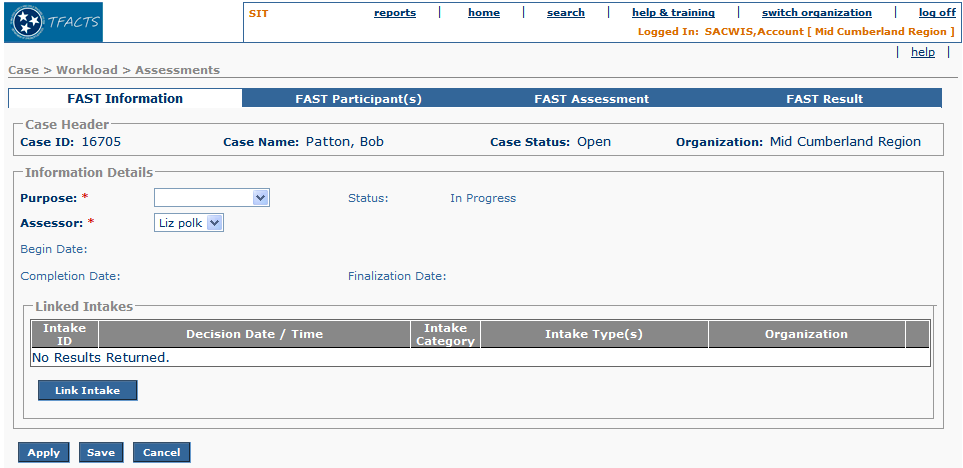![]()
When an intake is screened in and assigned, all assessment activities are documented in TFACTS. The assessments are recorded using specific tools according to the type of intake or case. You can open an assessment tool from the Case Overview screen.

The assessment tools in TFACTS are:
Safety assessment
SIU Assessment
Family Advocacy and Support Tool (FAST)
Life skills assessment
Safety assessment
The safety assessment is completed in response to a CPS intake, or any other instances throughout the life of a case when safety needs should be assessed. See Record a safety assessment.
Only one active investigation with a track of investigation, special investigation (SIU), or assessment may be linked to the safety assessment.
A safety assessment must be recorded for a case before adding an Immediate Protection Agreement (IPA) to the same case. An IPA is required when safety interventions must be implemented because the family cannot manage the current safety threats. In practice, the IPA is completed on paper forms during field work and later recorded into TFACTS. See also Record an Immediate Protection Agreement. Results of the Safety Assessment are to be recorded in the Family Functional Assessment.
Special Investigation Unit (SIU) Strength and Risk/Safety Assessment
The SIU safety assessment is completed by the Special Investigation Unit (SIU) and documents the risks and strengths for alleged child victims and alleged perpetrators. This assessment includes information about the child's family and environment and concludes with an overall assessment rating.
For the assessment, you can create a new case or link an existing case. Cases available for linking are those cases that have one or more participants in common with the investigation. See Record a SIU strength and risk/safety assessment.
Family Advocacy and Support Tool (FAST) assessment
The FAST assessment is one of the first assessments to be completed when opening a case. At this point the child is living with the family. A case can have multiple FAST records. The FAST is not completed for children in custody.
All narratives in the FAST get incorporated into the Family Functional Assessment (FFA) and are locked. Once data from the FAST assessment goes to the FFA, the worker cannot change it in the FFA. See Record a FAST assessment.
Family Functioning Assessment (FFA)
The FFA is an ongoing record and lasts for the duration of the case. The FFA has no end date, no status, and no result. It is used to record information for the family. Details for individual case members are not tracked. The system copies narratives and scores results from other assessments into the FFA. See Record a FFA assessment.
The FFA is frozen when the case is closed. If the case is re-opened, existing narratives remain frozen and only new narratives can be appended.
Child and Adolescent Needs and Strengths (CANS) assessment
The CANS assessment is used to aid in child placement, identify service needs, and support performance-based contracting to facilitate permanency. The system copies information from the CANS to the FFA. See Record a CANS assessment.
Life skills assessment
The life skills assessment is generally used to record the results of the Ansell Casey Life Skills Assessment (ACLSA) for a youth that is at least 14 years old. If the ACLSA is not an appropriate assessment for a particular youth, another life skills assessment can be utilized and documented within TFACTS.
There are two sections: one for the youth and one for the caregiver. In TFACTS you record information regarding the administration of the life skills assessment, specifically the raw scores. If the ACLSA was not administered to the youth, you can use the narrative in the assessment to record the results of the other assessment. The system also copies appropriate narrative information from the life skills assessment to the FFA. See Record a life skills assessment.
See www.caseylifeskills.org for more details about the Ansell Casey assessment.
Family Functional Assessment (FFA)
The FFA is not an assessment tool; it is the ongoing narrative record of a case. The FFA has no end date, no status, and no result. It is used to record information about the family. Details for individual case members are not tracked. The system copies narratives and scores results from other assessments into the FFA. See Record a FFA assessment.
The FFA is frozen when the case is closed. If the case is re-opened, existing narratives remain frozen and only new narratives can be appended.